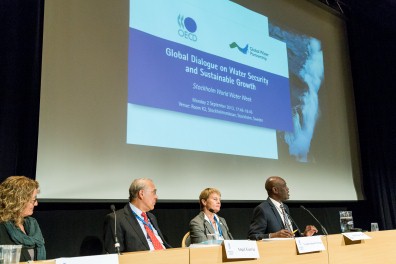The components of the Global Dialogue will highlight the issue of water security within the Post 2015 Development Framework, and will provide substantive material to the UN Open Working Group for the Sustainable Development Goals (SDGs).
The GWP-OECD project was launched at a side event at the World Water Week in Stockholm on 2 September, with GWP Chair Dr. Ursula Schaefer-Preuss introducing the project. The message was clear: Exceptional water challenges require an exceptional response. After centuries of taking water for granted, many countries now acknowledge that water stresses and increasing risks can jeopardize their economies and development gains.
High-level Panel
One of the key elements of the project will be a high-level global dialogue panel, to be co-chaired by Angel Gurría, Secretary General of OECD, and President Ellen Sirleaf Johnson, President of Liberia and UN Goodwill Ambassador for Water and Sanitation.
Speaking at the launch in Stockholm, Mr. Gurría highlighted the economic aspect of the project, but stressed that the perspective has to be wider than that: “If you only look at economics, you will leave out the most vulnerable people and have problem with equity. On the other hand if you only look at equity, then the infrastructure will suffer.”
Mr. Gurría said there has to be a balance, and that the key word is risk assessment: “Knowing and measuring the risks of water will give us the chance to manage it in the future.”
Mr. Bai-Mass Taal, Executive Secretary of the African Ministers' Council on Water (AMCOW), represented President Ellen Sirleaf Johnson at the launch. He said that President Sirleaf Johnson had asked him to convey the message of Africa – that water security is crucial to solving many of Africa’s problems.
“Water is at the center of development, it’s a central driving force behind economic development. Water security in Africa faces a lot of challenges. We have water but we cannot access it, because there is no infrastructure. Only 3 percent of the water resources are being utilized in Africa,” said Mr. Taal.
Expert Task Force
The GWP-OECD project will also involve an Expert Task Force, which will consist of a multidisciplinary team of recognized economists, water managers, and scientists. Their task will be to develop, model and economically assess a set of water security scenarios at the global and selected basin level, with the aim to illustrate and compare alternate strategies and pathways for achieving water security. This task force will be coordinated by Dr. Claudia Sadoff of the GWP Technical Committee.
Additionally, a further set of Country Consultations on water will be organized by GWP. These consultations will feed questions and information into the policy process.
Dr. Claudia Sadoff said that the task force has a complicated and difficult job ahead, with organizing and coordinating a substantive research programme.
“The structure of the task force will be to work from risk based perspective: we will document economic costs and risks associated with water, and then we will look at trade-offs and benefits.”
Addressing the question on how to move from plan to action in the GWP-OECD project, Mr. Gurría explained that the task force will not be starting from scratch. There are already policies in place, but examples are scattered all over the place. The big task at hand will be to look at what works, and what doesn’t.
Photo: From the left, Dr. Claudia Sadoff, Mr. Angel Gurría, Dr. Ursula Schaefer-Preuss and Mr.Bai-Mass Taal.

